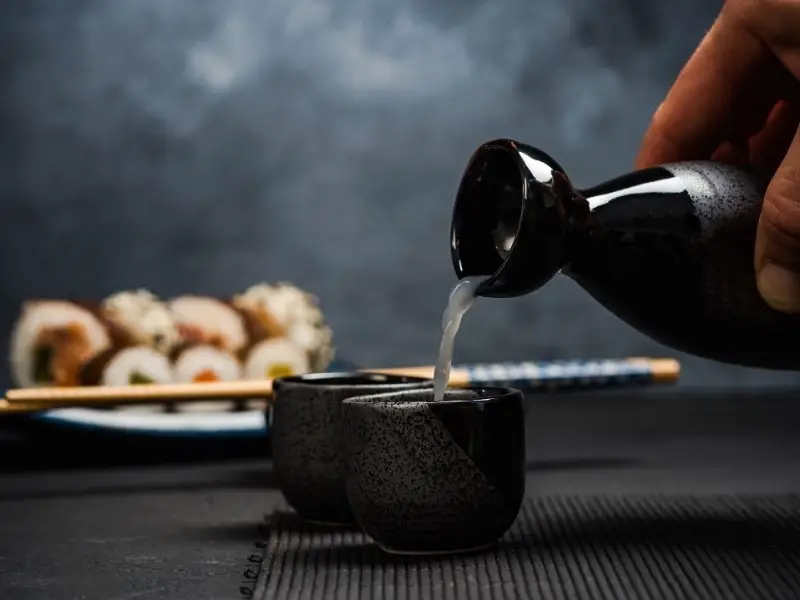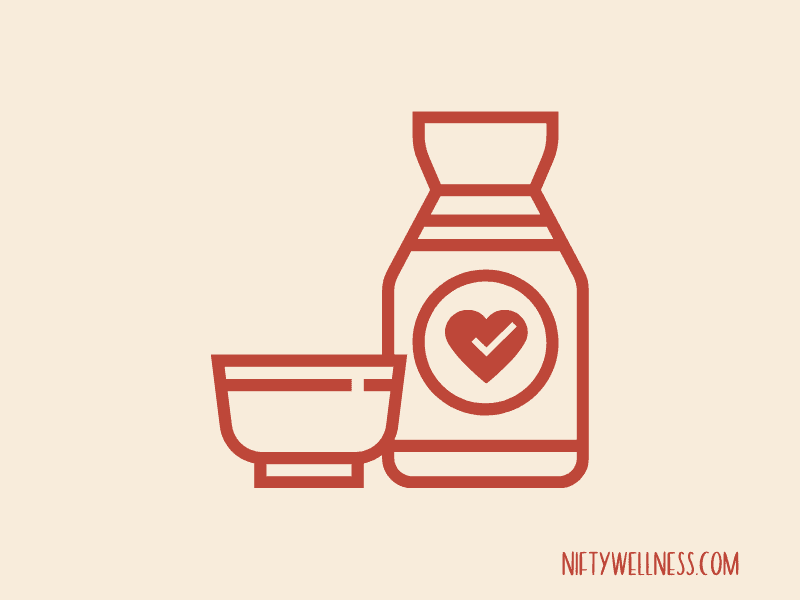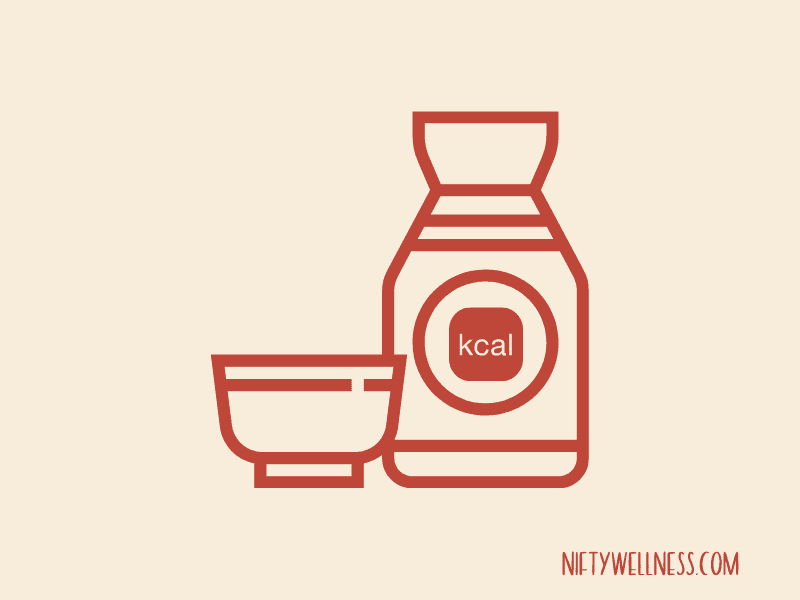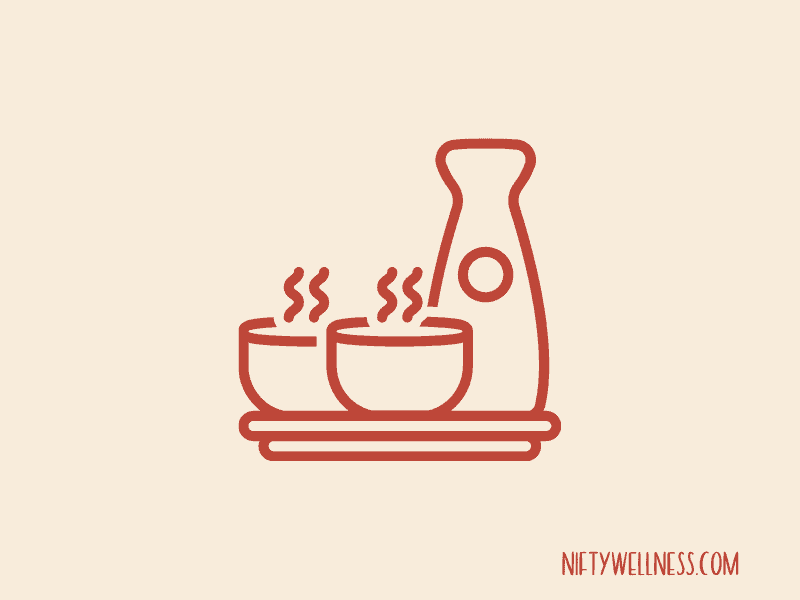Odds are you’ve probably heard of sake. Perhaps you have enjoyed a shot or two at your favorite sushi restaurant or walked by a bottle in your grocery store’s wine aisle and wondered what is that? This article will teach you all about sake, its health benefits, and its side effects.
Now, this isn’t particularly “healthy nutrition”, but we just like sake so much. And if you’re going to drink alcohol, it’s probably one of the healthiest options.
So, let’s get started!
What Is Sake?


Sake (pronounced “sah-KAY”) is the national beverage of Japan. This wine, made from fermented rice, has been enjoyed since at least the 8th century.
In Japan, sake is referred to as nihonshu or “Japanese liquor.” Being Japan’s national beverage, sake is enjoyed during holidays, ceremonies, and other special events.
The drink is typically poured from a tall bottle, called tokkuri, into small porcelain cups known as sakazuki.
While it is unclear when sake originated, its earliest known production date was in 500 BC China. The villagers would chew rice and nuts and then spit them into a communal tub where the saliva’s natural enzymes stimulated the fermenting process and made sake. Yeah, yucky sake.
Around 710 BC, a new brewing method spread across Japan. The technique used koji, a mold enzyme that aids in rice fermentation, and the results produced the same sake loved and enjoyed today.
Modern technological improvements have boosted the production of sake, allowing it to become a drink enjoyed by the masses.
Check out our blog 10 Pine Pollen Benefits, Side Effects & Tincture Benefits. Explore the extraordinary world of pine pollen benefits and more!
Health Benefits Of Sake

Want to know the health benefits of Sake? Read on!
In addition to the trace amounts of manganese, copper, iron, magnesium, phosphorus, and potassium; drinking sake may provide several powerful health benefits.
Sake is rich in antioxidants, which can help combat oxidative stress in the body. Some studies suggest that moderate sake consumption may contribute to heart health by improving cardiovascular function. So if you ask ‘Is sake healthy?’ here is the answer: Sake nutrition contains amino acids that could potentially enhance skin health and boost the immune system. While it offers these potential benefits, it’s essential to consume sake in moderation and consider individual health conditions. So, ‘Is sake good for you?’ or ‘Is sake bad for you? Moderation is essential, and consulting with a healthcare professional is advisable to know the answer to the question, ‘Is sake good?’
Aids In Digestion
Sake contains several digestive aids such as lactobacillus, a probiotic known for helping digestive issues. It is also much easier on the stomach than other alcohol types as it is low in sulfites and disruptive acids.
Sake is one-third less acidic than wine, so if you commonly experience acid reflux when drinking alcohol, sake could be a more enjoyable option.
Naturally Gluten-Free

Sake is an excellent alcoholic choice for those with gluten sensitivities or intolerances as it is naturally gluten-free. Some types may contain gluten, but those will be knock-offs, as real sake’s main ingredient is only rice, which is 100% gluten-free. Moreover, for those watching their calorie intake, sake is a good option as it tends to be lower in calories than other alcoholic beverages. Is sake fattening? Not particularly, making it a lighter choice for those conscious of their calorie consumption. So, Is sake healthier than wine? Well, when considering alcoholic options, it’s worth noting unique sake health benefits that potentially make it a healthier choice than wine in certain aspects.
Rich In Amino-Acids
Sake contains over 20 amino acids, including the amino acid ornithine.
Ornithine is a non-protein making amino acid that has positively influenced several physiological functions, such as improving sleep quality and fighting fatigue.
Sake’s amino acids are also beneficial for strengthening skeletal muscle and improving athletic performance.
Boosts Immune System
The purity of sake ingredients, as well as its high amino acid makeup, may help boost our body’s immune response. Amino acids are the building blocks of protein and have an essential role in building a robust immune system. The inherent purity of sake, coupled with its robust amino acid profile, fortifies the body’s immune response. Amino acids, integral to protein synthesis, play a pivotal role in enhancing overall immune function. As we consider sake’s health benefits, its potential to bolster immune resilience stands out prominently.
Excellent Source Of Selenium
Sake’s richness in selenium extends its health impact beyond immune support. This essential trace mineral contributes to improved thyroid function, reduced inflammation, slowed cancer progression, and effective anti-aging properties. When comparing sake to other beverages, its selenium content positions it favourably, suggesting potential health advantages.
Sake is also a great source of selenium. This essential trace mineral has a wide array of health benefits from improving the immune system, improving thyroid function, reducing inflammation, slowing cancer progression, fighting premature aging, and boosting overall health.
Combats High Blood Pressure

Sake is full of beneficial peptides that aid the body in preventing disease. Peptides are smaller versions of proteins but are still composed of valuable amino acids. Within the body, these peptides inhibit the enzymes that cause high blood pressure.
Sake may also improve blood circulation and oxygenation because of its selenium content. The average adult needs 55 micrograms of selenium per day. An eight-ounce glass of sake contains 3.3 micrograms of selenium.
Good For Your Skin

Beyond its delightful taste, sake’s foray into the beauty world is driven by its moisturizing and brightening effects.
Sake, beloved for its moisturizing and brightening effects, has become a popular ingredient in the beauty world. The fermenting agent koji has been shown to inhibit the development of melasma and other forms of hyperpigmentation such as dark spots and freckles.
Sake’s influence transcends the glass, emerging as a sought-after skincare ingredient for those pursuing a radiant and even complexion.
Read our blog 3 Awesome Red Sage Root Benefits & Side Effects (Proven). Uncover the secrets to enhanced vitality, improved focus, and a healthier you.
Is Sake Fattening?


According to sake’s nutritional profile, a one-ounce pour of sake contains the following:
- 39 Calories
- 0 Grams of sugar
- 1.5 Grams of carbohydrates
- 0 Grams of fat
- 0.1 Grams of protein
Compared to other alcoholic beverages, a 5-ounce (150ml) pour of sake contains 195 calories.
- Wine 5oz : 125–150 calories
- Beer 5oz: 43–64 calories
- Vodka 5oz: 323 calories
While sake may have a higher calorie profile than beer or wine, that doesn’t mean it is more fattening. One reason is that sake has a higher alcohol percentage; thus, you can drink less sake than beer or wine and still feel the same effects.
In traditional servings, sake is served in 3-ounce pours compared to wine’s standard 5-ounce pour.
The ingredients in sake are also straightforward—rice, water, yeast, and fermenting agents—meaning that you are not consuming unnecessary additives. And it also contains less sugar than other alcoholic beverages.
In addition, one study found that koji, the fermenting enzyme used to make sake, may have anti-obesity and anti-diabetes effects.
Side Effects Of Sake

Alcohol consumption inherently increases one’s risk of developing disease. In addition to developing some cancers, alcohol consumption has been linked to high blood pressure, liver disease, stroke, pancreatitis, and heart disease.
An occasional serving of sake isn’t much of a big deal, especially if you want to experience some of the supposed benefits of sake, but be aware of the cumulative effects alcohol can have on your body.
Being mindful of your alcohol consumption may help you avoid some of these adverse side effects.
How To Enjoy Sake


In this modern age of sake, there are so many styles and flavors to enjoy. Whether you like dry, sweet, or sparkling, there is a sake for everyone to enjoy.
If you are a novice sake drinker, be open to trying many different types of sake to find out which flavor profiles you most enjoy.
Sake can be served hot, cold, or at room temperature—depending on your preference!
A good rule of thumb is that high-quality sakes should be served semi-chilled (around 45 degrees Fahrenheit), and less expensive sakes should be warmed up in order to disguise some of its off-notes.
In general, as long as you don’t chill a sake below 40 degrees or warm it above 105, you’ll enjoy it.
While sake is traditionally served in tokkuri, it can also be served in small saucers, ceramic cups, or even wine glasses.
Bonus tips: you don’t have to enjoy sake with just seafood or sushi. It goes well with most food! And, if you aren’t drinking alone, remember it is common etiquette always to pour sake for others and then allow others to fill your cup.
Conclusion
In conclusion, the journey into sake goes beyond its unique taste and cultural depth. Sake benefits, ranging from amino acids to selenium, offer a distinctive dimension to alcoholic beverages. The myriad ways to enjoy sake and its cultural significance make it a fascinating choice. Whether sipping it alone or with a company, sake provides a sensory and cultural experience that extends beyond its liquid form.
So, as you can see, sake has health benefits that other drinks don’t. It has a unique taste, many ways to drink it, and a lot of culture behind it. So, are you going to try it?
Let us know in the comments below! And even though we don’t have any more articles about alcoholic beverages, since we’re on the topic of Chinese culture, check out our article about red sage root.
Frequently Asked Questions (FAQs)
Is sake a low-calorie alcoholic beverage?
Yes, sake is relatively low in calories compared to other alcoholic beverages. A one-ounce pour of sake contains about 39 calories, making it a moderate choice. Its higher alcohol content allows for consuming less volume while experiencing the same effects. Additionally, sake’s simplicity—comprising rice, water, yeast, and fermenting agents—contributes to its lower calorie profile. Enjoying sake in moderation aligns with a balanced approach to calorie-conscious drinking.
How does sake support cardiovascular health?
Sake may benefit cardiovascular health through peptides that inhibit enzymes causing high blood pressure. These peptides, composed of valuable amino acids, contribute to improved blood circulation and oxygenation. Additionally, sake’s selenium content, averaging 3.3 micrograms per eight-ounce glass, aligns with the recommended daily intake. These factors collectively support cardiovascular well-being, making sake a potential positive addition to a heart-conscious lifestyle.
Can sake help with stress relief?
While moderate alcohol consumption, including sake, may temporarily alleviate stress by inducing relaxation, it’s crucial to exercise caution. Excessive alcohol intake can have adverse effects on mental health. The relaxing effects are short-lived, and reliance on alcohol for stress relief is not a sustainable solution. Seeking healthier stress management strategies, such as exercise, mindfulness, or social support, is recommended for long-term well-being.
Are there any downsides to sake consumption?
Yes, there are potential downsides to sake consumption. Excessive alcohol intake, including sake, can lead to various health issues, such as liver disease, cardiovascular problems, and an increased risk of certain cancers. It can also contribute to addiction, mental health issues, and impaired judgement. Moderation is crucial, and individuals with certain health conditions or those taking medications should consult with a healthcare professional before consuming sake or any alcoholic beverage.
What are the best food pairings for sake?
Sake pairs wonderfully with a variety of foods, enhancing the dining experience. It complements the umami in Japanese cuisine, making it an ideal sushi, sashimi, and tempura companion. Additionally, sake’s versatility complements non-Japanese dishes, such as cheese, grilled meats, and seafood. Experimenting with different pairings can reveal delightful combinations that suit individual tastes.
